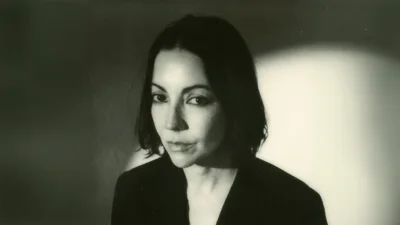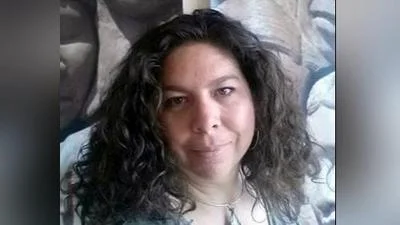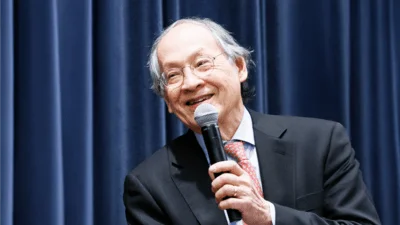The Latin word sublimis is taken from the prefix sub, ‘up to,’ and the suffix, limus, ‘oblique.’ The word means high up, great. In English the word is sublime. Something that is sublime has vastness, an immense quality that is elevated.
The Lark Ascending program performed by Pro Music Santa Fe was just that: An elevated program underscored by great compositions and performances, conveying grand themes.
Premiering the Santa Fe debut of the Pulitzer-winning composition, Voiceless Mass by Raven Chacon, The Lark Ascending program was a diverse collection of classic and contemporary compositions.
Along with Chacon’s Voiceless Mass, the program consisted of Mendelssohn’s Songs Without Words, Kojiro Umezaki’s selections from Cycles, Colin Jacobsen’s Mirror for a Prince and Ascending Bird, Anton Dvorak’s Songs My Mother Taught Me, and Vaughan Williams’ The Lark Ascending.

Colin Jacobsen (left) and Kojiro Umezaki (middle) at Santa Fe Pro Musica. Photo: Nick Barral/Santa Fe Pro Musica
Concerning the program, artistic director Colin Jacobsen stated, “Some of the music reaches for the sky…and some of it plumbs the tectonic depths of the earth.” Jacobsen summarized the themes found in The Lark Ascending program as cycles, time, and instrumentals, music lacking words.
Conductor David Felberg led the stellar musicians through Voiceless Mass, and with three of the composers— Umezaki, Jacobsen, and Chacon—in attendance, it was a night to remember.
As the title of the program hints, some of the works were influenced by birds. Larks are passerine foul (perching birds), found around the world, but with only one species inhabiting naturally in North America, the Horned Lark.
In Japan, the primary lark is the Skylark. With Japanese-born composer and shakuhaci flutist Kojiro Umezaki performing selections from Cycles, the evening was a meditation, ascending to the heavens.
The first Cycles composition was America. It incorporated a Walt Whitman poem by the same title. Using electronic segments/loops of a period recording of man reading the poem (some say Whitman), the composition was scored for percussion and ocean waves. The second piece from Cycles was What Falls Must Rise. Using electronic loops resembling birds and wind, Umezaki played the bamboo flute (shakuhaci), accompanied by cello, violins, and viola. Both pieces were reflective, beautiful.
The shakuhaci flute was used by monks in Japan for breathing and medtiation. With themes of “freedom, law, and love” (America) and perseverance and resilience (What Falls Must Rise), the works highlighted sublime virtues.
Composed for organ, flute, clarinet, bass clarinet, two percussionists, strings and sine tones (harmonic waves), Voiceless Mass is a profound composition, addressing the intersection between Indigenous and European worldviews.
Before the performance Chacon told the full house at the Saint Francis Auditorium that when the conquistadors and priests came to the US, they came “Not to share, not to teach, not to even persuade, but force the Native people to become Catholic.”
Consequently, many of the Native people suffered greatly, losing their voices, with some languages and tribes becoming extinct. “They were silenced,” Chacon states. “I wrote the piece Voiceless Mass to talk about this silencing, this loss of language…Ten displaced musicians around the auditorium under the watchful eye of the organ [representing the church].”
Continuing, Chacon states, “This piece is not totally accusatory…I’m happy to say that it’s opened up dialogue, and I’ve been invited by different congregations and organizations to perform the piece, and it’s allowed them the opportunity to acknowledge the history and to apologize.”
 Raven Chacon at Santa Fe Pro Musica. Photo: Nick Barral/Santa Fe Pro Musica
Raven Chacon at Santa Fe Pro Musica. Photo: Nick Barral/Santa Fe Pro Musica
With the musicians spread throughout the auditorium, the performance was haunting, a composition worthy of the praise it’s received. And with cultural indifference seen throughout history by most civilizations, the sublime message of Voiceless Mass is one of promising hope, a yearning for justice.
Colin Jacobsen, founding member of the genre-bending quartet Brooklyn Rider, performed many of the works during the evening, but two of his compositions, Mirror for a Prince and Ascending Bird were highlights. Both were wonderful, but I really resonated with Ascending Bird. From its pensive beginning to rhythmic ending, the piece is about a bird that tries to reach the sun, changed along the way, a metaphor for spiritual transformation.
Like Cycles and Voiceless Mass, the sublime reminder of Ascending Bird is that of renovation, the need for personal renewal.
As the Latin definition of the word “pro” means (“in favor of” or “on behalf of”), Pro Musica’s program was truly favorable, a gift on behalf of a top-notch musical organization, bringing quality compositions and performers to an admiring audience.
When music and meaning, being and becoming, converge, it’s sublime. And The Lark Ascending was!
For more information about Santa Fe Pro Musica and upcoming concerts, click here: https://sfpromusica.org.

Orchestra at Santa Fe Pro Musica. Photo: Nick Barral/Santa Fe Pro Musica
Brian C. Nixon, Ph.D., is Chief Academic Officer and professor at Veritas International University in Albuquerque. As a writer, musician, and artist, his interests surround the philosophical transcendentals: truth, beauty, and goodness. You can contact Brian via his Bandcamp email address: https://briancharlesnixon.bandcamp.com








